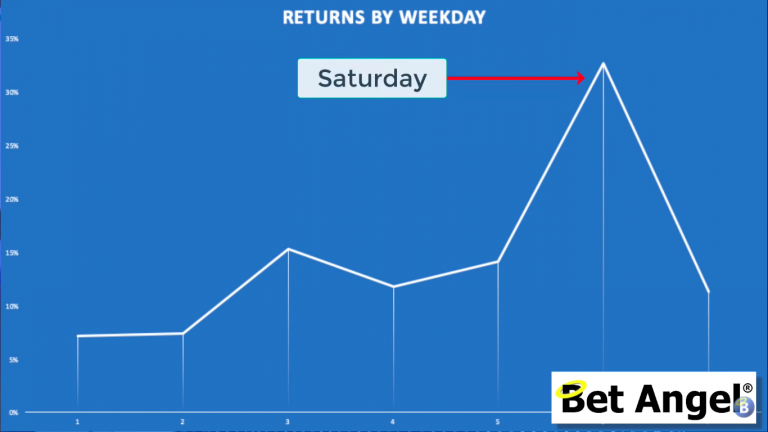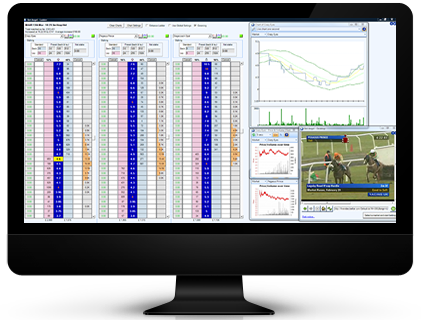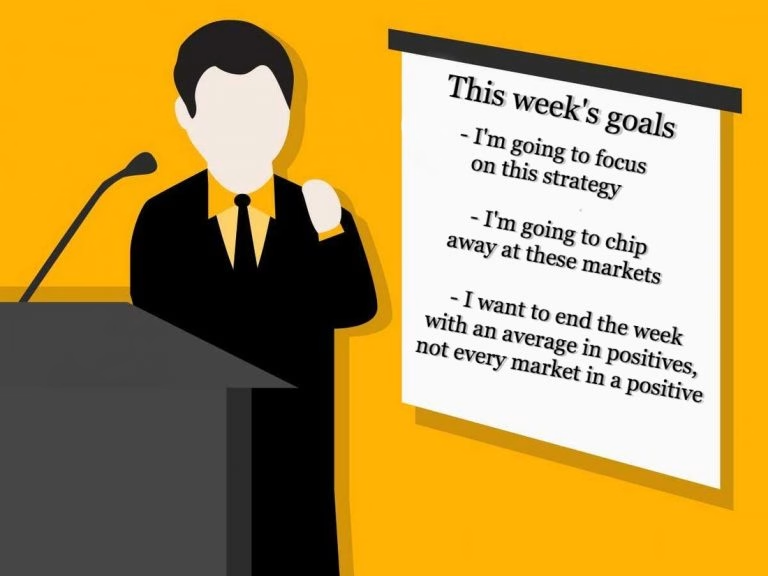How much money can you make? Setting sensible targets
Are tiy thinking about how much can you make this year? Could it be £100,000? £1 million? £10 million?! What should be your actual target?
There is actually a very simple (and sensible!) answer for you which clearly defines exactly what your objective is and what targets you should set when you’re Betfair trading.
Why can some targets be bad?
When trading, be cautious about setting rigid targets. While earning money is crucial, insisting on arbitrary goals like “I need to make £250 a day” is approaching it the wrong way. Trading doesn’t fit neatly into such black-and-white expectations; it’s dynamic and influenced by many factors.
Take my long-term profits, for example—they follow the sports calendar. Earnings are low in January and February, rise in March, peak in the summer, and decline afterward. This pattern reflects the seasonal nature of the sports I trade. Your experience might differ based on what and when you choose to trade.
My advice? Make the most of the busy seasons—trade while the sun shines. In the summer, there’s plenty happening, making it possible to earn significant sums. But in the winter, with fewer events and markets, it’s unrealistic to expect the same returns.
So, it’s unwise to have a fixed target spread evenly across the year. Recognise that you’ll likely earn more during certain times and less during others. Adjust your expectations accordingly, and you’ll approach trading more effectively.

This even works for me if we go down to a weekly basis on pre race trading on the Betfair exchange. Most of the money that I make tends to occur towards the weekend because that’s when most of the sporting activity is on. It’s not always like that, because you do get little bumps and peaks at other times depending upon what you’re going to do, but generally, it is skewed towards the end of the week.
So even if I have a bad time at the start of the week, it doesn’t really matter because by the time the weekend comes, I’ve got plenty of opportunity to make it up. However, I don’t look at it like that! I don’t look at it as though I’m making up a certain amount of money. That’s just part of the cycle.
It’s useful that the week finishes on a Saturday for me. Early in the week, there’s a lot less opportunity and there is less money in the market. So it’s Mondays and Sundays that are the days I usually take off or do other things as it slowly peaks up until the weekend (typically on a Saturday like shown in the image above.)
Ultimately, the amount of profit that you make is dictated by the market and the underlying events within it. Now this is how you need to objectively look at what potential profit you have. Luckily for you, I’ve got a really simple way of doing that…
Why can some targets be bad?
One of my trading ‘secrets’ is that I’m engaging in more markets than ever before.
When I first started on Betfair, manually placing and closing positions was slow and limited how many markets I could trade. But when Bet Angel launched in 2004, everything changed—it allowed me to trade faster and do much more within the markets.
As Bet Angel evolved, I began trading more frequently across a wider range of sports. Now, with automation, I can simultaneously participate in multiple markets even while actively trading another one. It’s amazing to do all sorts of weird, wonderful, and crazy things across so many markets!

The opportunity is still massive
Thanks to Bet Angel and automation, my trading opportunities have exploded. One reason I perform so well is that I’ve got something happening around the clock! Even when I’m actively trading on-screen, other versions of Bet Angel are busy exploring different strategies in other markets—or even the same one.
This multitasking is a game-changer. It allows me to hit my targets by doing more within the markets, and it actually reduces risk. Instead of relying on one big £200 trade, I can make several smaller ones to reach my goals. That’s the key: setting a rigid daily target like £100 can be limiting because you’re confined to the number of markets available that day.
Instead, stretch your time frame. Aim to be profitable over a week rather than a day. By trading hundreds of markets in a week, your target becomes more achievable, and you can lower your stakes, reducing pressure. It’s easier to trade actively with smaller amounts—you won’t feel as stressed if a trade doesn’t go your way.
£1K short term target? Good or bad?
Let me illustrate this with an example to give you some perspective. Suppose your weekly target is £1,000. If you trade only five markets, you’d need to make £200 per trade without any losses to reach that goal—that’s quite a challenge!
Now, consider spreading that £1,000 target over a thousand markets. Suddenly, you only need to average £1 profit per market. You might be up £2 on one, down £1 on another, up £5 here, down £3 there. This approach is far more reasonable and manageable, and it naturally includes and expects some losses along the way.
I use an automation strategy that’s made around over £100k over time. When you look at its equity curve, which charts cumulative profits and losses, you’ll see a gradual climb stretched over a long period. It’s not about scoring big wins; it’s about consistent, incremental gains.
£1K short term target? Good or bad?
Let me illustrate this with an example to give you some perspective. Suppose your weekly target is £1,000. If you trade only five markets, you’d need to make £200 per trade without any losses to reach that goal—that’s quite a challenge!
Now, consider spreading that £1,000 target over a thousand markets. Suddenly, you only need to average £1 profit per market. You might be up £2 on one, down £1 on another, up £5 here, down £3 there. This approach is far more reasonable and manageable, and it naturally includes and expects some losses along the way.
I use an automation strategy that’s made around over £100k over time. When you look at its equity curve, which charts cumulative profits and losses, you’ll see a gradual climb stretched over a long period. It’s not about scoring big wins; it’s about consistent, incremental gains.
The amounts I win or lose on individual trades are relatively small. My simple trick? I just do a lot of them! While each trade involves minimal risk and modest profits, they collectively add up to a significant total. This automated strategy runs alongside my manual trading, working in the background. At the end of the week, I can look back and think, “Oh yeah, it’s been a good week!”
The more markets I participate in, the more I yield; fewer markets mean less earnings. By spreading my efforts over a large number of markets, achieving my overall objective becomes very attainable. So yes, aiming for £1,000 is a good goal, but it shouldn’t be a short-term target.
£1K short term target? Good or bad?
If I asked you to pull off a £200 profit on the next race, you’d probably be shocked and think it’s unrealistic. But if I told you your goal is to make just £1 per trade, you’d likely feel confident about achieving that. The key is replicating these small gains over time.
For example, if you aim to make £100,000 in a year by trading 50,000 markets, you’d need to average a £2 profit per market (£100,000 divided by 50,000). You won’t win exactly £2 every time—sometimes you might gain £5, other times lose £3—but it averages out. This approach is much more reasonable and less risky than trying to score huge profits from single trades.
Setting targets this way is like crafting a business plan. It’s a smarter method for managing risk and your trading objectives, rather than randomly throwing money at the market and potentially falling behind your goals. Having a clear, definable pattern of behavior helps you stay on track.
Personally, I know how many markets I’m likely to trade next year. With advancements in automation and semi-automation tools like Servants, my capacity to trade has increased significantly. Not only am I trading more markets, but I’m also placing more trades within those markets.
You don’t need to chase big, glory-seeking totals on individual events. Your objective should be more subtle: focus on consistent, incremental gains over time.

£100,000 in a year is it possible?
Curiously, in my experiance, It’s easy to achieve bigger targets if you focus on small average profits over a large number number of markets, not setting a large target per race.
Now, If you’re looking at how much money you could possibly make it’s important to note that if you’re starting out to say you probably won’t make any money! Ultimately, what you’re looking to do if you’re trying to get to the stage where you earn a decent sum of money, is looking for a much broader objective.
You’re not saying I need to make a certain amount over this period of time, you’re prioritising the idea that you are going to trade ‘x’ many markets and therefore this is my overall objective. It makes life a lot simpler and easier to cope with. It also significantly reduces the amount of stress that you have when you’re actively trading.
Don’t look at your P&L
The other thing you can do is not look at your P&L, if you look at your P&L and you have a figure in mind that you’re attempting to achieve during a certain time period, then that tends to force you to pursue more aggressive strategies when it isn’t going well.
It may be that the market just isn’t in your favour at that moment in time. You just have to keep on ploughing on and doing the things that you know are right and eventually, it will turn around at the end of that longer period. It’s sometimes hard to stay patient, but it may take more than a week, a month for you to even out. Many a small loss can turn into a much bigger one if you are chasing a target.
Summary
If you want to know how much you could possibly trade and how much money you could make from that trading, I think that your objective really is not to set that arbitrary figure, but to look at the number of markets you’re trading and set your total trading goal from there.
So do you think this or next year will get you that big profit? Remember, don’t fraternise with your losses, it is your goal to end up positive overall on average.
With that mindset, it will help you succeed and possibly reach that £100,000…or whatever your target is.